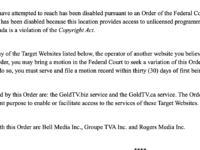Site blocking has been on the policy and regulatory radar screen for several years in Canada, starting with the Bell-led Fairplay proposal to the CRTC and demands for site blocking as part of the copyright review. With both the CRTC and elected officials rejecting site blocking proposals, rights holders have turned to the courts. Last month, a Federal Court of Canada judge issued a major website blocking decision granting a request from Bell, Rogers, and Groupe TVA to block access to a series of GoldTV streaming websites.
The case is an important one, representing the first extensive website blocking order in Canada. I’ve argued that it is also deeply flawed from both a policy and legal perspective, substituting the views of one judge over Parliament’s judgment and relying on a foreign copyright case that was rendered under markedly different legal rules than those found in Canada. Allen Mendelsohn, a Montreal based Internet lawyer and sessional lecturer at McGill University joins the podcast this week to help sort through the issues.











